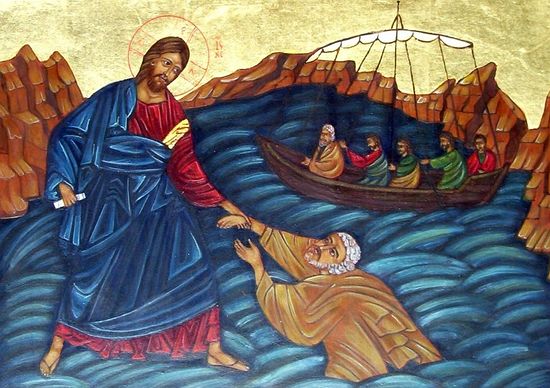“Fasting is walking on water”
 Orthodox Pastors on Great Lent
Orthodox Pastors on Great Lent
Orthodox Christians have begun the ascetic labor of Great Lent. Many have waited for this time of increased repentance with joy, but there are also those who look at it with dread. Pravoslavie.ru asked several priest of the Russian Orthodox Church to give us a few comforting words as we set out upon the holy forty-day fast.
—Fasting is not a question of nourishment or changing dishes. It is a question of our relationship to God. First of all, fasting exists so that a person would receive spiritual benefit. We sinful people do not want to limit ourselves in anything voluntarily. We want everything to be easy, light, and quick. How does a person usually act? He makes himself a sandwich with a slice of salami or cheese and runs off on his business. This won’t work during the fast. Fasting is humility.
Before starting to fast we need to know the Church’s rule for fasting. Not in order to break it, but so that we can orient ourselves by it. It is not so simple to know what this rule is. You have to make an effort, and find an authoritative source. For example, the Reference Book for Clergymen [in Russian] published in 1913 and republished by the Moscow Patriarchate in 1993. [A quick guide to fasting in English can be found here—Trans.]
The main thing is to not make yourself eat during the fast. Do not be afraid of fasting. Remember how the Apostle Peter saw the Lord walking on the water and asked: “Lord, bid me to come to You on the water.” The Lord bade him, and Peter went, but then he doubted: How could this be? And he began to drown. The Lord reached out his hand and saved him. Fasting is walking on the water. There is no need to go overboard worrying about how you’re going to live on fasting foods. Experience shows that the Lord helps, especially if the fast is combined with prayer, with attending services, repentance, and Communion. Holy righteous John of Kronstadt said, “When I do not take Communion I die.” It is the same for us—when we feel that our strength is running out, we can go more often to Church, take Communion, and pray. In this lies the wisdom of Great Lent, in this is its important lesson for us: It shows us our weakness; it shows us especially clearly that without God we can do nothing.
Of course, no one makes us fast to the point of dizziness and dragging feet. A person should be healthy during the fast, he should have strength, including for attending the Great Lenten services. It’s just as in pedagogy: It’s bad to overdo it, but it’s pointless if you don’t do enough.
Fasting is work; there is no benefit without work. It is a serious job to change a human soul—the hardest job there is.
Fasting is a time of purification, repentance; a time that helps us leave this vain world in which we live from day to day without often thinking about what is most important. Time goes by and we are in the same place; the soul has not changed. So it would be good for us to make friends with fasting. After all, it gives us the most important thing—spiritual transformation.
And what services there are during Great Lent! They are especially remarkable during the weekdays, when we read the prayer of St. Ephraim the Syrian and make prostrations. That was Pushkin’s favorite prayer. Try not to miss these services. They are very needful to us, because they help us to repent, to correct ourselves. They make us remember that we are after all mortals and will have to answer for our lives. We love to take showers, to take care of our bodies, but we forget that the soul and its purification are more important.
Think through the time that is dedicated to Great Lent, and try to get the most out of it. For example, why not take vacation time for the first week, for Passion Week, or Bright Week? In tsarist times, Great Thursday through Bright Week were state holidays and no one worked. The peasants didn’t go out in the fields, no matter how good the weather. But there was no harm done to agriculture, because God helped. You have to think through this this time in advance, because there can be temptations in the form of some enticing trips, vacations, or the family will suggest it’s time for remodeling… Our life is given to us not so that we would simply live and live. It is given so that our souls would come closer to the Kingdom of Heaven.
Priest Nicholai Bulgakov
Source: Pravoslavie.ru






